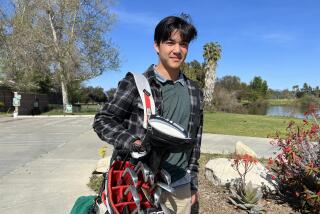HUNTINGTON BEACH : A Boy With a Problem Solves It
- Share via
At age 12, Marc A. Suchard couldn’t read. A dyslexic, he found words hard to decipher and writing almost unthinkable. School was a chore because he thought he was dumb.
Now 18, Suchard, in a sense, has evolved. Not only does he read and write well above average, he has written computer software on the evolution theory--a feat that has earned him honors as one of the top high school scientists in the state.
After three months of tinkering in his family’s den and skipping some homework assignments, Suchard has created a computer program that illustrates how the evolutionary process works. Using a mathematical formula, the project simulates a population of organisms breeding under natural selection. The project earned him top honors at this year’s prestigious California Science Fair finals.
“I thought I was pegged as being stupid because I couldn’t read,” Suchard said. “Now I feel pretty good about myself.”
Suchard’s award-winning project explores two widely argued theories of evolution--gradualism, which asserts that evolution occurs over thousands of generations, and punctuated equilibria, which states that species remain relatively the same over millions of years before rapidly evolving.
Suchard’s software, a “colony” of numbers representing simple organisms evolving in a mathematical environment, demonstrates that the punctuated equilibria theory is plausible. When the mathematical environment changes on the computer screen, the numbers “jump” and quickly form into another kind of species.
“It’s sort of like a computer fossil,” Suchard said. “When the environment changes, the numbers change and leave some traces behind. The computer model leaves fossil records.”
Suchard was a “standout” among the 37 students who entered the state science fair, said David Combs, science curator of the California Museum of Science and Industry in Los Angeles, which sponsored the fair. The winners were selected for creativity, scientific thought, skills, clarity and thoroughness.
The competition yielded two finalists from Orange County--Suchard and Timothy Chan, a Unviersity High School senior.
“You could tell Suchard really knew what his science project was all about. He didn’t have to grope for the facts,” Combs said. “He had incredible self-confidence.”
The self-confidence came after years of reading difficulties, Suchard said. When he was in elementary school, he performed above average in speech and math, but dyslexia kept him from grasping reading. He had to memorize his book reports and give oral presentations, rather than read them aloud.
“When he was in the first grade, he didn’t want to go to school anymore,” his mother, Phyllis, said. “All I would hear from him was, ‘Mom, I have a tummy ache,’ or, ‘I don’t feel good.’ He would say anything not to go to school.”
Suchard finally learned to read after his father brought home a personal computer for the family. Aware that he couldn’t master the computer without reading its accompanying technical manuals, Suchard pushed himself to learn to read them. By the time he entered junior high school, none of his teachers knew that he had a reading problem.
Now with college and the idea of a budding science career looming ahead, Suchard says he hasn’t made up his mind on what to do when he gets older.
“I know it’s going to be in a field where I’m going to help a lot of people,” Suchard said. “I’ve gone far even with this reading disability. Now it’s my turn to help others.”
More to Read
Sign up for Essential California
The most important California stories and recommendations in your inbox every morning.
You may occasionally receive promotional content from the Los Angeles Times.












